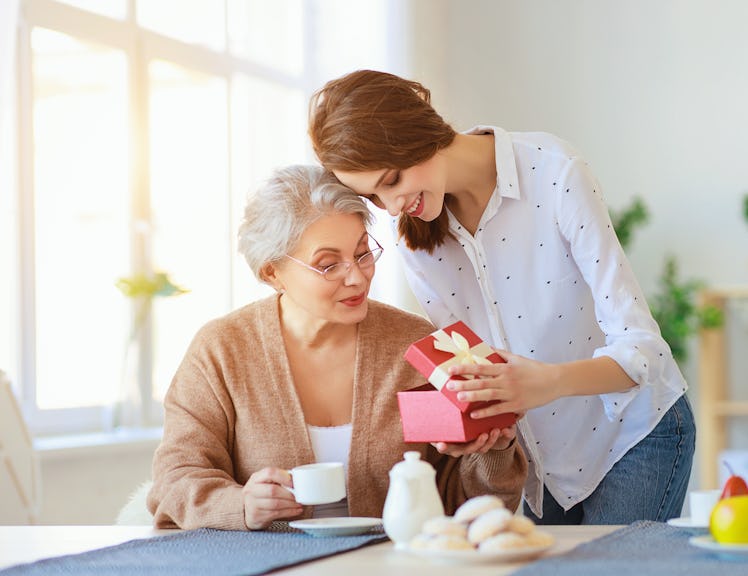
Here's What To Know About Safely Sending A Mother's Day Gift During Quarantine
As you gear up to celebrate Mother's Day, your mom's health and safety are likely at the forefront of your mind during this time. Continued social distancing means you might not get to spend Mother's Day with mom on Sunday, May 10, but can you still send her a present? If you're wondering if it's safe to send your mom a gift for Mother’s Day 2020, there's good news. Here's what you should keep in mind when sending packages to mom's house this year.
According to a study published in The New England Journal of Medicine on March 17, the novel coronavirus can live on plastic for up to three days — and on cardboard for up to 24 hours — but the U.S. Centers for Disease Control and Prevention (CDC) and the World Health Organization (WHO) haven't confirmed any cases of COVID-19 contracted from mailed packages. According to the CDC, the disease is thought to spread from respiratory droplets in human-to-human contact. So, how does this affect your annual Mother's Day gift of flowers and scented candles? Aside from taking a few extra precautions when receiving gifts, you can safely move forward with gifting as planned.
Time is on your side when it comes to keeping deliveries safe. Dr. Rachael Piltch-Loeb, Ph.D, a preparedness fellow at Harvard's T.H. Chan School of Public Health, tells Elite Daily the process of mailing a package from one point to another makes it unlikely for recipients to contract the virus from possibly contaminated surfaces. Piltch-Loeb says, "If the virus was on a package you sent — whether it was sent in cardboard or plastic — it would likely break down as it traveled through unstable conditions like the heat and cold in a truck or plane."
Companies are also taking safety precautions for their employees and the good of the public well before the package reaches your mom's door. Piltch-Loeb emphasizes that the systems in place to get mail from Point A to Point B minimize human contact, thanks to things like automated warehouses for shipping. Piltch-Loeb tells Elite Daily, "Even when your packages are packed by an individual, companies are taking precautions with employees who may load packages like requiring the use of masks and increasing sanitation procedures."
Precautions should also be taken when the package is delivered. Dr. Vincent Racaniello, Ph.D, a professor of microbiology and immunology at Columbia University, previously told Elite Daily you should be mindful when handling delivered packages. Racaniello explained, "Everything you touch is potentially contaminated." Therefore, he suggests you wash your hands and avoid touching your face before and after handling deliveries.
Piltch-Loeb similarly recommends having your mom wash her hands before and after opening the package, and after removing her gift from the package. As an added precaution, you can also ask your mom to wait 24 hours to three days after the delivery to open the package to make sure that any traces of a possible virus have disintegrated. You can also ask your mom to further sanitize certain gifts before and after she removes them from the packaging.
When scheduling your delivery, make sure to opt for no-contact delivery to ensure your mom is having as little person-to-person contact as possible — and make sure to tip delivery people well, if possible, for risking their safety to bring these items to your homes. With just a few added precautions and extra steps, you can still show mom how much your care.
If you think you’re showing symptoms of coronavirus, which include fever, shortness of breath, and cough, call your doctor before going to get tested. If you’re anxious about the virus’s spread in your community, visit the CDC for up-to-date information and resources, or seek out mental health support. You can find all Elite Daily's coverage of coronavirus here.
Experts cited:
Dr. Rachael Piltch-Loeb, Ph.D, MPH, preparedness fellow at the Harvard T.H. Chan School of Public Health
Dr. Vincent Racaniello, Ph.D, Higgins professor of Microbiology & Immunology at Columbia University